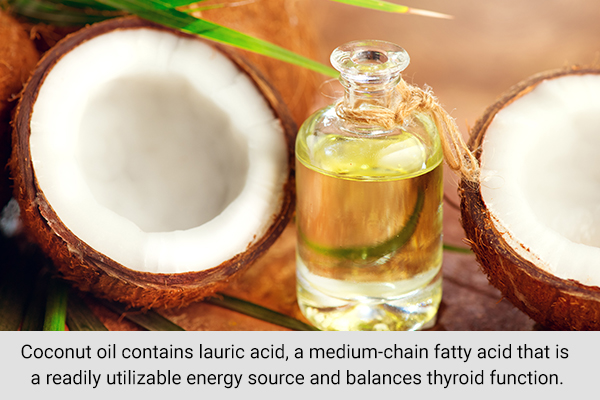In this article:
The thyroid gland is a major gland in the body and is located in the neck region. It secretes thyroid hormone, which regulates many physiological processes in the body such as growth, metabolism, and cell differentiation.

In recent times, thyroid diseases have emerged as the most common endocrine disorders, often leading to more complications including weight gain and hormonal imbalance.
The term hypothyroidism refers to a condition where there is a decreased thyroid function, whereas hyperthyroidism means increased thyroid function. In hypothyroidism, you will experience sluggishness, sensitivity to cold, insomnia, constipation, and a decreased heart rate, whereas in hyperthyroidism, you will feel sensitivity to heat and a fast or irregular heartbeat.
Recent research indicates that many vegetable oils may have a beneficial effect in treating thyroid-related problems. (1)
A recent study on the effect of soyabean oil, virgin coconut oil, and Moringa oleifera seed oil on rat models of hypothyroidism has shown that these oils improve thyroid function by increasing the production of thyroid hormone. (1)
Among the studied oils, coconut oil was very effective in fixing disorders of the thyroid. Read on to know more about it.
Why Is Coconut Oil Beneficial for Thyroid Function?
Coconut oil is available in two forms – copra oil and virgin coconut oil. Though both have similar fatty acid profiles, the latter is more beneficial to health since it contains higher amounts of some nutrients such as vitamin E and bioactive polyphenols. (2)
Another reason for the increasing popularity of coconut oil in alternative medicine may be attributed to the presence of the medium-chain fatty acids lauric acid, myristic acid, and palmitic acid. These fatty acids are directly absorbed in the intestine and transported to the liver. In the liver, these fatty acids exert many effects such as improving metabolism and protection from disease.
Dietary fatty acids are processed in the liver and transported by the blood. The medium-chain fatty acids in virgin coconut oil/coconut oil cause an increase in the production of thyroid hormone, thereby serving to treat hypothyroidism. (3)(4)
Recent reports indicate an improvement in goiter as well. (4) A recent study on hypothyroidism in rats has shown that the administration of virgin coconut oil improved the internal structure of the thyroid gland by strengthening the protein framework of the gland. (5)
How Does Coconut Oil Help in Maintaining Thyroid Health?

The thyroid is the second major gland in the body, and any abnormality in thyroid function has effects on many physiological functions. Hence, it is important to maintain a healthy thyroid.
Hypothyroidism is sometimes caused not by a deficiency of iodine in the diet but by inflammation, which may be due to an underlying microbial infection or an autoimmune attack on the thyroid. Whatever the cause of hypothyroidism, coconut oil is effective in managing it.
Many vegetable oils interfere with thyroid function on account of their high content of polyunsaturated fatty acids. (3) Coconut oil is unique in that it has a high content of medium-chain triglycerides, which when broken down produce medium-chain fatty acids. This may help balance thyroid function. (3)
Medium-chain fatty acids are directly transported into the digestive tract and used for energy production without being stored like other fats. This nourishes the thyroid. (3)
In addition, coconut oil contains lauric acid, another medium-chain fatty acid that is a readily utilizable energy source and balances thyroid function. It also has antimicrobial and anti-inflammatory activity. Thus, coconut oil suppresses inflammation and thereby has a positive effect on hypothyroidism. (3)
How Much Coconut Oil to Consume
Ideally, you should consume 3 tablespoons of virgin coconut oil daily or have it thrice a week depending on the severity of the condition. The easiest way to consume coconut oil is to add it to your curries, smoothies, or rice cake with raw almond butter spread over it.
Please remember that coconut oil is a saturated fat and can raise blood cholesterol levels, which is an existing consequence of hyperthyroidism. Keep checking your lipid levels every 3 months and consult a dietitian to figure out the best dose of coconut oil for you. (6)
Most-Asked Questions
Can coconut oil help people with thyroid problems?

Yes, because coconut oil helps boost metabolism.
Is coconut oil useful in the treatment of both hypothyroidism and hyperthyroidism?
It is more beneficial in hypothyroidism. It directly improves the activity of the thyroid hormone.
Which is more beneficial, coconut oil or virgin coconut oil?
Virgin coconut oil is more beneficial, but normal coconut oil can also be used with lesser effect. You can use it for cooking purposes.
Final Word
Animal studies show that coconut oil/virgin coconut oil can fix thyroid dysfunction, especially hypothyroidism. However, more human studies are needed to validate these results.
Coconut oil has a high content of saturated fatty acids, which if taken in excess could be harmful to the heart. Hence, human trials are needed to arrive at the optimum dosage of coconut oil to be administered for the treatment of thyroid dysfunction without the risks.
- Was this article helpful?
- YES, THANKS!NOT REALLY


